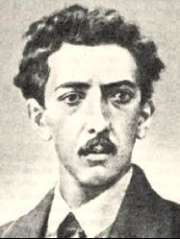|
Biografía Manuel Acuña
Manuel Acuña Narro (27 August 1849 – 6 December 1873) was a 19th-century Mexican writer. He focused on poetry, but also wrote some novels and plays. Even though he was famous at an early time of his life, he decided to commit suicide. It is not certain why he killed himself, but it is thought that he did so because of a woman.
Acuña was born in the city of Saltillo, Coahuila, on August 27, 1849 to Francisco Acuña and Refugio Narro. He was taught how to write and read at an early age. Later he studied in the “Colegio Josefino”, in Saltillo. Around 1865 he was transferred to Mexico City to the School of San Ildefonso, where he entered as a full time student. Here he studied mathematics, Latin, French and philosophy.
Acuña lived at a time at which Mexican society was dominated by philosophical-positivist intellectuality. Furthermore he was living as a romantic tendency in poetry was occurring.
In January 1868, Acuña initiated his studies in medicine at the Universidad Nacional Autónoma de México. He was a distinguished student, though he never completed his medical studies. During the first months there, he lived in a room in the ex-convent of Santa Brígida. From here he was transferred to a room at the medical school, the same one that some years before was inhabited by another Mexican poet, Juan Díaz Covarrubias. In this room, many of the young writers of that time met: Juan de Dios Peza, Manuel M. Flores, Agustín F. Cuenca, Gerardo M. Silva, Javier Santamaría, Juan B. Garza, Miguel Portilla, and Vicente Morales among others.
It was in 1868 when Acuña initiated his brief literary career. He first became known with a poem he wrote for the death of one of his close friends Eduardo Alzúa. In the same year, encouraged by the cultural renaissance that followed the triumph of the Republic, he participated, along with Agustín F. Cuenca and Gerardo Silva, among others, in the founding the Nezahualcóyotl Literary Society, in which he presented his first verses.
The works presented in the society were published in the magazine El Anáhuac (Mexico 1869) and in a pamphlet of the newspaper La Iberia named “Literary Essays of the Nezahualcóyotl Society”. This pamphlet is considered as one of the works of Acuña, since it contains, in addition to works of other writers, eleven poems and an article in prose of his own. He was only 24 years old when he had made a name for himself.
On May 9, 1871, a dramatic work that he wrote called “El pasado” (The Past) was released. This work was well received by the public and critics recognized him as an outstanding poet.
Rosario de la Peña was the woman that was the most intimately related to Acuñas’s last years. She was the great love of his life. In fact, most of Acuña's friend were in love with this woman although she never had a formal relationship with any of them. Her house was frequently turned in a social gathering place for these poets where each one exposed his new verses and debated philosophy.
Acuña committed suicide on December 6, 1873 after ingesting potassium cyanide. It is said that his body as his eyes were closed, tears sprang up. this was in accordance to advice given a poem that he wrote: "como deben llorar en la última hora, los inmóviles párpados de un muerto" (“As the immovable eyelids of a dead man must cry in the last hour") His unrequited love for Rosario de la Peña was said to be the motive for his suicide.
The day Acuña died, he was guarded by his friends at the medicine school. On December 10, Acuña was buried at the cemetery “Campo Florido”, with the attendance of representatives of literary and scientific societies, as well as a huge crowd of people that admired him. His brother Juan de Dios Peza, his best friend, Gustavo Baz, Eduardo F. Zárate and Justo Sierra gave their last goodbyes to Acuña. Finally his body was transferred to “La Rotonda de los hombres ilustres”, where a monument was erected in his honor.
|





